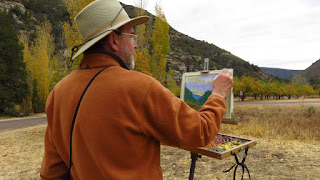As a voracious reader with eclectic tastes, I believe that a varied diet is best. It ensures that you get all the nutrients crucial to making good art. Books that teach, books that inspire, books that lead you down an unexpected path--each of these pushes us to a higher level.
With that in mind, I thought I’d share a few that are in my library. You probably have some favorites, too, and I’d love to hear about them.
Books that Teach
Carlson’s Guide to Landscape Painting by John Carlson
You plein air painters will recognize this title. Painting instructors like me tout this book as the “bible” for outdoor painters. And it is! Observations from many years of painting from life fill this book. In my workshops, I often talk about Carlson’s Theory of Angles--how light behaves in the landscape--but it contains so much more. It’s a rather dense book, though, printed in a tiny font and with old school black-and-white illustrations. It can be a tough read for those born into a world where information is spoonfed to us in easy-to-digest animated snippets. Still, the book is worth the effort, and if you have to read one book about outdoor painting, this is it.
Composition of Outdoor Painting by Edgar Payne
Not as well-known as Carlson’s book, this, too, I consider essential reading. If you’re having trouble with creating pleasing compositions for your paintings, Payne offers page after page of useful templates that you can apply to almost any scene. Templates are just a crutch, of course; over time, the intelligent artist will become more intuitive in design. But Payne also shares design basics for those of us who prefer to learn concepts rather than to memorize templates. Like the Carlson book, there’s a lot more to this one than I’ve described here.
Books That Inspire
The Art Spirit by Robert Henri
I’d call Henri’s book a bridge between teaching and inspiration. Compiled after Henri’s death by a student from class notes, the book contains many good rules for the painter, but what’s more, it offers inspirational nuggets about art and life. It’s more like a book of quotes than a book written according to a meticulous outline. “A great painter will know a great deal about how he did it, but still he will say, ‘How did I do it?’ The real artist’s work is a surprise to himself.” You can read this one with a yellow highlighter in one hand.
Dear Theo: The Autobiography of Vincent Van Gogh, Edited by Irving Stone
The movie industry and museums have elevated Vincent Van Gogh to legendary status. And, as with so many legends, truth is sometimes either distorted or invented. This volume of Vincent’s letters to his brother was compiled after their deaths by Johanna, Vincent’s sister-in-law and wife to Theo. Giving us an almost-daily look at Vincent’s life, the letters show us a painter who, possessed by a variety of demons both internal and external, swings from despair to ecstasy but who mostly walks a straight, sane line. There is much here for the reader to sympathize with and learn from.
Books That Lead Down a Different Path
Not every book I own can be tied directly to painting; some are on other topics that, in some way, influence me as a painter.
Pilgrim at Tinker Creek by Annie Dillard
Annie Dillard’s a writer, not a painter. But this, her first book, is filled with the quiet, patient observations of nature by someone who easily could have been a plein air painter: “Were the earth smooth, our brains would be smooth as well; we would wake, blink, walk two steps to get the whole picture, and lapse into a dreamless sleep.” But the earth is not smooth, and Dillard luxuriates in the world’s complex beauty. This book will help you become a better painter by teaching you to see more thoughtfully.
Basin and Range by John McPhee
John McPhee gets into a topic and then digs down as deep as he can. Basin and Range is about vast time and the geological landscape. As a painter who specializes in the landscape, I’m always fascinated by the story behind the scenes I paint. But McPhee gives me more than that, taking the tale into the cosmic: “If you free yourself from the conventional reaction to a quantity like a million years, you free yourself a bit from the boundaries of human time. And then in a way you do not live at all, but in another way you live forever.” I’ve been a fan of McPhee for a long time, but this book is one of his best.
These are just a few of the books I enjoy. I’d love to hear about yours.























































